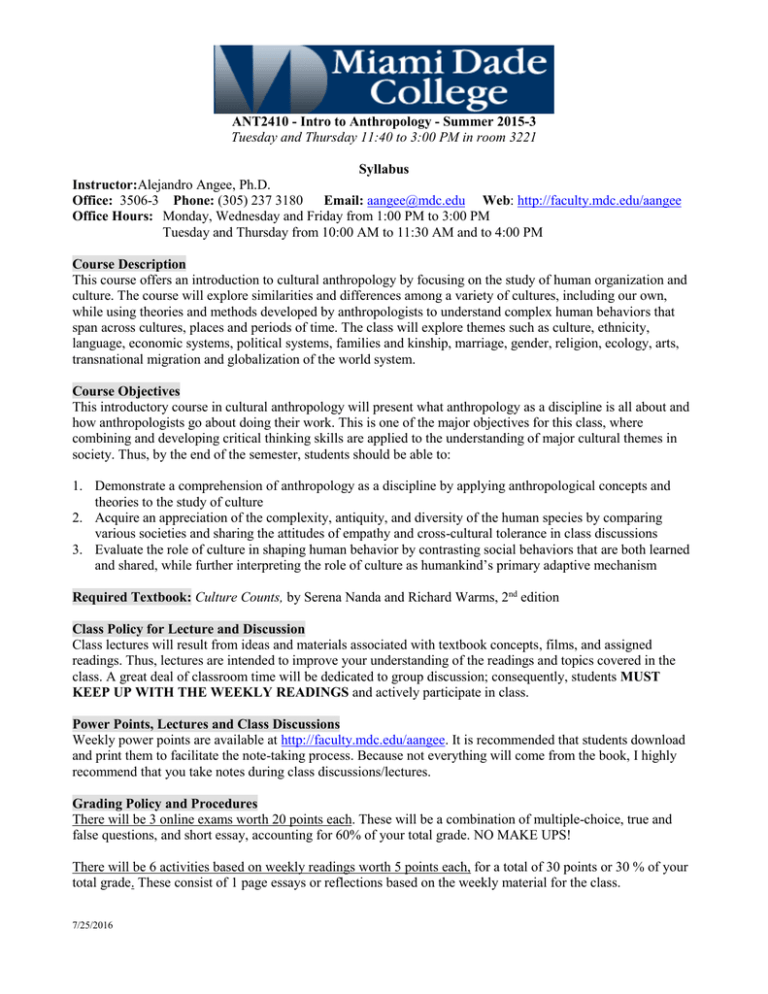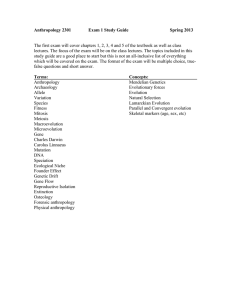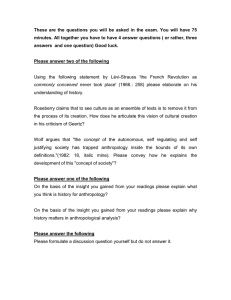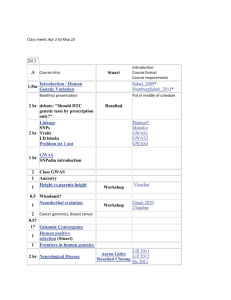ANT2410 - Intro to Anthropology - Summer 2015-3 Syllabus Instructor:
advertisement

ANT2410 - Intro to Anthropology - Summer 2015-3 Tuesday and Thursday 11:40 to 3:00 PM in room 3221 Syllabus Instructor:Alejandro Angee, Ph.D. Office: 3506-3 Phone: (305) 237 3180 Email: aangee@mdc.edu Web: http://faculty.mdc.edu/aangee Office Hours: Monday, Wednesday and Friday from 1:00 PM to 3:00 PM Tuesday and Thursday from 10:00 AM to 11:30 AM and to 4:00 PM Course Description This course offers an introduction to cultural anthropology by focusing on the study of human organization and culture. The course will explore similarities and differences among a variety of cultures, including our own, while using theories and methods developed by anthropologists to understand complex human behaviors that span across cultures, places and periods of time. The class will explore themes such as culture, ethnicity, language, economic systems, political systems, families and kinship, marriage, gender, religion, ecology, arts, transnational migration and globalization of the world system. Course Objectives This introductory course in cultural anthropology will present what anthropology as a discipline is all about and how anthropologists go about doing their work. This is one of the major objectives for this class, where combining and developing critical thinking skills are applied to the understanding of major cultural themes in society. Thus, by the end of the semester, students should be able to: 1. Demonstrate a comprehension of anthropology as a discipline by applying anthropological concepts and theories to the study of culture 2. Acquire an appreciation of the complexity, antiquity, and diversity of the human species by comparing various societies and sharing the attitudes of empathy and cross-cultural tolerance in class discussions 3. Evaluate the role of culture in shaping human behavior by contrasting social behaviors that are both learned and shared, while further interpreting the role of culture as humankind’s primary adaptive mechanism Required Textbook: Culture Counts, by Serena Nanda and Richard Warms, 2nd edition Class Policy for Lecture and Discussion Class lectures will result from ideas and materials associated with textbook concepts, films, and assigned readings. Thus, lectures are intended to improve your understanding of the readings and topics covered in the class. A great deal of classroom time will be dedicated to group discussion; consequently, students MUST KEEP UP WITH THE WEEKLY READINGS and actively participate in class. Power Points, Lectures and Class Discussions Weekly power points are available at http://faculty.mdc.edu/aangee. It is recommended that students download and print them to facilitate the note-taking process. Because not everything will come from the book, I highly recommend that you take notes during class discussions/lectures. Grading Policy and Procedures There will be 3 online exams worth 20 points each. These will be a combination of multiple-choice, true and false questions, and short essay, accounting for 60% of your total grade. NO MAKE UPS! There will be 6 activities based on weekly readings worth 5 points each, for a total of 30 points or 30 % of your total grade. These consist of 1 page essays or reflections based on the weekly material for the class. 7/25/2016 Attendance to class is required, especially because this class has a short duration of only four weeks. Students are allowed no more than 2 absences. Any absence beyond that point will carry a full letter grade penalty from the final grade. The breakdown of your final grade is as follows: Item Exam 1 Exam 2 Exam 3 Weekly HW Attendance and Participation Total Points 20 20 20 30 10 100 A = 90 - 100 B = 80 - 89 C = 70 - 79 D = 60 - 69 F = 59 and below Course/Departmental Policies Semester deadlines and important dates: http://www.mdc.edu/main/academics/academic_calendar.asp Students with Disability or Special Needs: Please let me know if you need any special accommodations. Academic Honesty: All students are deemed by the College to understand that if they are found responsible for academic misconduct, they will be subject to the Academic Misconduct procedures and sanctions, as outlined in the Student Handbook. If You Miss a Class: Please do not email your professor to ask if you “missed something important” the day you were absent! Surely you missed something important! Please follow your syllabus closely, download the power points from the website, and call or ask a classmate if you need the notes for that day. o Please note that I will not take any assignments through email. If are not coming to class, you must make arrangements to get the assignment into me, in paper. Cell Phone Policy: ABSOLUTELY NO CELL PHONE USE IS ALLOWED IN THE CLASSROOM. Semester Schedule Date May 12 - Tue Topics and Objectives What is Anthropology? Film: Cultures at the far edge of the world Due Materials May 14 - Thur Culture and Cultural Change Cultural relativism Handout May 19 - Tue History, theoretical trends and ethical issues Read Chapters 1 and 2 of class textbook HW1 Due Read Chapter 3 of class textbook May 21 - Thur Communication and Language May 26 - Tue Making a Living, May 28 - Thur Economics and political organization June 02 - Tue Sex And Gender June 04 - Thur Class, Race and Ethnicity June 09 - Tue Social Stratification June 11 - Thur Religion June 16 - Tue Power, Conquest and the World System June 18 - Thur Globalization Read Chapter 4 of class textbook HW 2 Due Read Chapter 5 of class textbook Read Chapters 6 and 9 HW 3 Due Read Chapters 8 Read Chapter 10 HW 4 Due Read Chapter Read Chapter HW 5 Due Read Chapter12 Read Chapter 14 HW 6 Due 2


